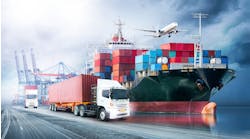Download this article in PDF format.
Earlier this month, Mastercard and Asian Development Bank (ADB) announced a new initiative focused on digitalizing supply chains for organizations. This is just one of several efforts centered on streamlining the supply chain payments process in the digital age, and one that’s being driven by a mix of current business conditions and existing business challenges.
Mastercard says it’s working with N-Frnds, SGeBIZ and Finastra—and that it has the support of ADB—to develop technology solutions that will “drive greater digital efficiency across the retail supply chain in Asia and increase wholesalers’ access to credit.”
The company points to the global pandemic as one of several factors that drove the partners to get behind the new initiative. “These unprecedented times underscore the importance of building an inclusive, sustainable digital economy, including through the application of technology to digitize trade, which can make it easier for small and medium-sized businesses to participate in global supply chains,” Mastercard’s Michael Froman said in a press release.
“Innovative partnerships like this one can support the agility and resilience of supply chains,” he added, “accelerating access to finance and improving efficiency.”
Pandemics and Downturns
The global pandemic and accompanying economic impact have severely disrupted supply chains and trade networks, particularly for small and medium enterprises (SMEs) that account for 90% of all global businesses, employ about half of all workers and deliver more than half of gross domestic product, Mastercard says.
The pandemic has also reduced control over cash flow, it adds, and access to credit by SMEs. “Even before COVID-19, the ADB estimated there was a $1.5 trillion funding gap in 2018, with smaller businesses most impacted,” Mastercard points out in the release. “The International Chamber of Commerce estimates a potential $2 trillion to $5 trillion shortfall in trade financing through 2021 if demand returns to the global economy.”
For these and other reasons, Mastercard is rallying the public and private sectors to come together to enable a faster and more efficient shift towards digitalization for SMEs across global supply chains, trade and access to financing. It’s launching its new program in Indonesia with 500 retailers and aims to build to 5,000 retailers by the end of the first quarter of 2021.
“ADB has been working closely with the Government of Indonesia in its efforts to alleviate the impact of the [COVID-19] pandemic, including through the $1.5 billion financing approved in April 2020,” says ADB’s Ahmed Saeed. “Our partnership with Mastercard and its alliance partners in the pilot digital supply chain project will provide critical access to finance to affected MSMEs and immediate assistance to keep the food and essential goods supply chain running.”
New Lending Pathways
Mastercard says the collaboration will increase the digital data available to assess creditworthiness and create new models to evaluate it. For example, it says access to the resulting lines of credit will enable wholesalers to react more quickly to upcoming promotions, increase their inventory levels and build their businesses.
“One of the most fundamental problems for SMEs and micro-businesses across Asia is access to finance,” said Finastra’s Simon Paris. “Without credit, financially excluded businesses become caught in cycles that restrict their capacity to grow and leave them underprepared for the effects of market disruption. Technology is the enabler to tackle financial inclusion challenges. As part of this collaboration, we are able to drive change to bring positive outcomes, through digital transformation and innovative new lending pathways.”










